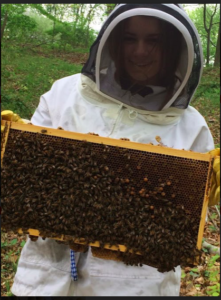Olivia Cipperman ‘19
This year, the Episcopal Academy has gained a student organization in support of community and ecological health: the Bee Club. Founded by Alexander Peters ’19 and Camilla Stapleton ’19, the club aims to teach students about the merits of bees and beekeeping and to connect the EA community at all levels. Along with such environmentally-minded clubs as GYLI and EcoAction, Bee Club hopes to make a difference in the environment and enrich the EA community as a whole.

Photo courtesy of Cheryl Gray Mitchell.
As part of their initiative, the Bee Club wants to explore the possibility of placing beehives on campus. Its student leaders believe that having hives will benefit EA students and give them a unifying activity. Stapleton says, “A hive is a really good example of a lot of things. It shows a lot of… different things working together and a lot of different pieces in complete harmony.” Apiaries would allow for a common learning experience between the Lower, Middle, and Upper Schools, as well as collaborative beekeeping with other environmental clubs. Cheryl Gray Mitchell, Bee Club advisor, and upper school science teacher describes such collaborations as an “organic, natural spillover.” However, the hives have yet to be approved.
Mitchell explains the hive project’s current roadblocks. “There was just too much concern about… our community being allergic to stings,” she says, “Along with the placement of the hives.” The leaders of Bee Club approached Director of Operations Mark Notaro and school health authorities to draw up safety guidelines. They also pinned down a location for hives below the Campus Center parking lot. Even so, community concerns remained. Mitchell says, “There was concern that the bees would forage into the White Horse area where a lot of our EA families are. I guess there was just too much concern from an administrative viewpoint to get a go, to get a green light.” She says that the project has not been cancelled, but it has been put on hold at the present time.
A large part of the problem with installing an apiary, Bee Club leaders hypothesize, stems from common misconceptions about bees. EA has a problem with wasps and yellowjackets, both of which are aggressive species that are frequently mistaken for honeybees. Stapleton explains, “All the ‘bees’ you see around campus are actually wasps… Bees are nothing to be afraid of. They’re not harmful, and they have this incredible world that we should really try to learn more about.” Naomi Hyman ’22 says, “The honey bees won’t sting you unprovoked, but the wasps will.” Tracey Rosenberg ‘21 reiterates an administrative concern, saying, “If you’re allergic to bees, they’re a hazard.” Although bees sting, however, they will not sting unprovoked. Bee Club leaders wish to spread the word.
If beehives were to be approved for the EA campus, they would fit right in with the school’s interest in helping the environment. Episcopal already implements environmental care through clubs, such as EcoAction, GYLI, and Farm Club. The school has both an on-campus farm and a compost system. Anjali Bose ’20 comments, “EA definitely makes an environmental impact.” However, Stapleton believes that the community can do more. She says, “If you just look around, everything is landscaped. Everything is fertilized. Not a lot of people drive ecologically-friendly cars. There’s a lot of impermeable surface.” Although she recognizes that EA is on the path to environmental sustainability, she aspires for more.
Honeybees are pollinators, a natural and dwindling type of organism that is necessary to the healthy functioning of an ecosystem. Mitchell explains, “Honey bees are in an extinction spiral. We’re having lots of problems keeping pollinators alive because of various things like widespread pesticide use that’s really having a devastating effect on the honeybee population.” If the EA community took care of bees, protecting them from poisonous pesticides and crippling mites, it would impact the local ecosystem for the better. Bees would also provide an aesthetic service. Mitchell says, “In my garden, the flowers have just sprung to life in the past few years we’ve had bees.”
Bee Club is currently making steps toward educating the EA community about bees and connecting different groups on campus. An apiary would only help them to achieve their goals further. As Mitchell concludes, “It involves everything and everyone. We all live in an ecosystem. We all live in the EA community: the ecological community, and the cultural community.”